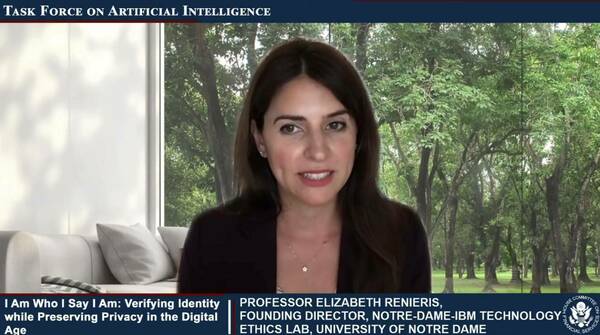
On Friday, July 16th, the founding director of the Notre Dame-IBM Technology Ethics Lab, Elizabeth M. Renieris, testified before the U.S. House of Representatives Financial Services Committee. Elizabeth spoke before the Committee’s Task Force on Artificial Intelligence in a virtual hearing titled “I Am Who I Say I Am: Verifying Identity While Preserving Privacy in the Digital Age.” The hearing concerned the future of digital identity frameworks in the United States, the development of secure, reliable, and interoperable digital identity solutions that minimize fraud and identity theft while respecting individual privacy and security, and the proposed Improving Digital Identity Act of 2020, a bipartisan bill seeking to set government-wide policy to modernize U.S. digital identity infrastructure.
Elizabeth joined four other witnesses including Jeremy Grant, Coordinator, Better Identity Coalition, David Kelts, Director of Product Development, GET Group North America, Dr. Louise Maynard-Atem, Research Lead, Women in Identity, and Victor Fredung, CEO, Shufti Pro.
Task Force on Artificial Intelligence Chairman Representative Bill Foster (IL) and Ranking Member Representative Anthony Gonzalez (OH) opened the hearing with short statements, after which each witness shared a five-minute opening statement.
In her statement, Elizabeth described an emerging “cyber-physical reality” encompassing work, education, healthcare, banking, government services, and more, accelerated by the COVID-19 pandemic, the proliferation of connected internet of things (IoT) devices, and the aggregation, digitization, and algorithmic manipulation of data on a massive scale. In this cyber-physical reality, cyber attacks increasingly jeopardize the security and availability of physical resources such as the energy grid, hospitals, and financial institutions. As access to these systems increasingly depends on a trustworthy, reliable, and secure identity verification scheme, and as our workplaces, schools, and communities shift to the hybrid cyber-physical world, she described how digital identity is quickly becoming critical infrastructure.
Highlighting both the dangers of outsourcing digital identity systems to privately owned and operated profit-maximizing organizations and the efforts by other countries and jurisdictions such as Canada, New Zealand, and the European Union to prioritize public digital identity infrastructure, Elizabeth urged the federal government to take the lead on creating guidelines and standards for the design, development, and deployment of digital identity systems as critical infrastructure. She noted that these guidelines would facilitate the creation of digital identity systems that respect the civil and human rights of individuals and communities, promote fairness, transparency, and accountability from organizations designing and deploying digital identity schemes, and address potential information asymmetries, discrimination, and other consequences of integrating emerging technologies such as artificial intelligence and blockchain into digital identity schemes.
Last, Elizabeth urged the task force to consider limiting when and where identification is required, cautioning against a future in which identification is the rule rather than the exception.
The witnesses then took questions from members of the task force. Elizabeth addressed several questions from Representatives Alma Adams (NC), Jake Auchincloss (MA), Sean Casten (IL), and Van Taylor (TX). Additionally, Representative Maxine Waters (CA), Chairwoman of the Financial Services Committee, offered her comments and thanks to the witnesses.
You can watch a recording of the hearing below or on the House Financial Services Committee’s YouTube channel, and you can read the Committee Memorandum here.
